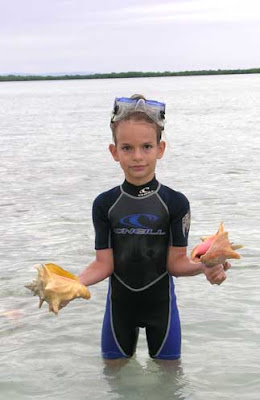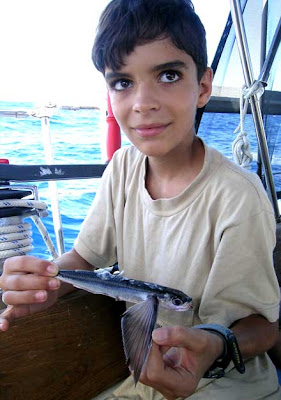
Greetings from Bocas del Toro, Panama, a tiny town on the island of Colon.
We've been here for three weeks now, after a fabulous 800 mile passage from Isla Mujeres, Mexico--one of our best crossings ever.
It has been raining hard for five straight days! The water is rising, good thing we came by boat.
On Christmas Eve we read the first four chapters of Luke, and perhaps because we are away from family and friends, those verses seemed especially poignant. For me, this time of year is an especially good time to ponder the profound and sometimes ironic teachings of Christ. Things like: Love your enemies...turn the other cheek...go with him twain...let him have your cloak also...love thy neighbor as thyself...blessed are the meek...blessed are they that mourn...blessed are the peacemakers...blessed are the pure in heart...
Also ironically, I'm sitting in a bar with free wireless, the rain is thundering down, but Santa visited our boat by dug-out cayuca last night, and so the boys are busily happy with their new loot. Despite the rain and humidity and dirty laundry, Lora and I feel greatly blessed.

Bocas del Toro, a small water-front village that somehow draws intrepid travellers from mostly Europe--backpackers, surfers, and sailors seem to congregate here.

Edwin and Rogelio, two natives, show off some red tree frogs on, you guessed it, Red Frog Beach. The frogs are actually poisonous.

Lora stylin' on a beautiful Panamanian beach.

A view of our neighbor's boat, Bruadair, and a passing Hobie catamaran.
Damon and David also sailed from Kemah Texas.
 This is what's left of a 35" Barracuda that Henry caught. It was yummy.
This is what's left of a 35" Barracuda that Henry caught. It was yummy. We sailed in company from Guatemala through Belize to Mexico, with another Texas boat, Cayuse, with a super set of triplets aboard. In Isla Mujeres Hailey& Cameron Haltom, along with Parker and Henry, eye an octopus. Our boys sure enjoyed all the fishing, darts, ping-pong, and Monopoly games.
We sailed in company from Guatemala through Belize to Mexico, with another Texas boat, Cayuse, with a super set of triplets aboard. In Isla Mujeres Hailey& Cameron Haltom, along with Parker and Henry, eye an octopus. Our boys sure enjoyed all the fishing, darts, ping-pong, and Monopoly games. Hungry? Another view of that octopus.
Hungry? Another view of that octopus. Lora suited up to do some serious snorkeling (she gets cold easily).
Lora suited up to do some serious snorkeling (she gets cold easily). For two weeks we pounded to windward in 20 knots of headwind, enduring some of our worst conditions ever, and all to rendezvous with this man, my nephew, Michael, who poses here with Parker. We had a lovely time with him and his fiancee Christa, and her family the Tooles.
For two weeks we pounded to windward in 20 knots of headwind, enduring some of our worst conditions ever, and all to rendezvous with this man, my nephew, Michael, who poses here with Parker. We had a lovely time with him and his fiancee Christa, and her family the Tooles. In Belize we ended up spending a few days near Garbut Cay, Belize. While there we met Harrison Garbut, who jokingly introduced himself as the mayor of the uninhabited cay. He showed us the best beach, the best place to fish, and where to find coconuts and conch.
In Belize we ended up spending a few days near Garbut Cay, Belize. While there we met Harrison Garbut, who jokingly introduced himself as the mayor of the uninhabited cay. He showed us the best beach, the best place to fish, and where to find coconuts and conch. A tiny hermit crab can amuse a boy for hours.
A tiny hermit crab can amuse a boy for hours.
Typical pastel get-away in Placencia, Belize.
 We had some tasty coconuts from this tree in Belize.
We had some tasty coconuts from this tree in Belize. Pauli, the mighty conch hunter, catches dinner.
Pauli, the mighty conch hunter, catches dinner. This conch, and several of his relatives, were our dinner one night. Tastes a little bit like clams, and just as chewy.
This conch, and several of his relatives, were our dinner one night. Tastes a little bit like clams, and just as chewy.
 This is a close up of a conch's innards and eyes. Not very appetizing, is it?
This is a close up of a conch's innards and eyes. Not very appetizing, is it?

We loved all the pretty colors in Placencia, houses, flowers, and people--several cultures are well represented here.


 A competitive game of cockpit Monopoly. Can you tell who's winning?
A competitive game of cockpit Monopoly. Can you tell who's winning?
Parker at the bow-pulpit in all his Spiderman-underwear glory.



As I said, its been raining for five days straight, but we're hoping for a rainbow soon.
Happy Holidays.











 Lora bagging groceries--sacks cost extra. The corn tortillas are twice as thick as the ones in Mexico. Instead of asking for a certain number of tortillas, you ask for a certain number of
Lora bagging groceries--sacks cost extra. The corn tortillas are twice as thick as the ones in Mexico. Instead of asking for a certain number of tortillas, you ask for a certain number of 

 Parker posing.
Parker posing.



 This is the most popular beer in Guatemala. Lora calls it chicken beer.
This is the most popular beer in Guatemala. Lora calls it chicken beer.

 Pauli gives Guatemala the thumbs-up.
Pauli gives Guatemala the thumbs-up. 

 These flowers grow at Xalaja, our marina.
These flowers grow at Xalaja, our marina.


 Much of Latin America's tropical
Much of Latin America's tropical  In the past 30 years Central America has lost about 66% of its
In the past 30 years Central America has lost about 66% of its 


 It is estimated that
It is estimated that 







 (
( We’
We’











